Eugene Moss
b. January 16th, 1914 in Jewell (Georgia)
d. October 19th, 1984 in Atlanta (Georgia)
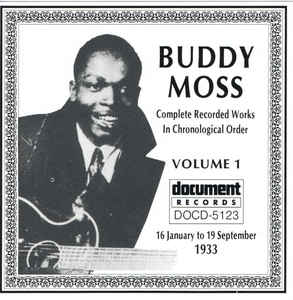
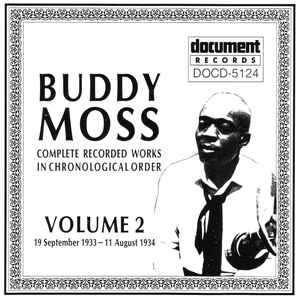
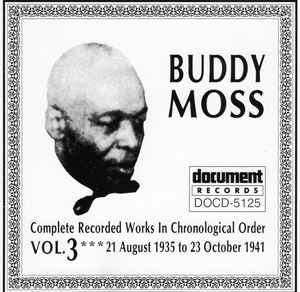
COMPLETE RECORDED WORKS
Document
Volume 1 (January - September 1933)
Volume 2 (September 1933 - August 1934)
Volume 3 (August 1935 / October 1941)
Fils d'un métayer, il nait à Jewell et grandit à Augusta en Georgie avec ses onze frères et soeurs. Il se fixe à Atlanta dès 1928. Autodidacte à la guitare et à l'harmonica, Buddy attire l'attention des musiciens de la ville comme Barbecue Bob et Curley Weaver. Avec eux, il joue au sein des Georgia Cotton Pickers où il tient l'harmonica. Leurs premiers enregistrements ont lieu en décembre 1930. Puis, en janvier 1933, il grave ses premières faces en leader pour ARC (American Record Company) et toutes ses marques (Oriole, Banner, Perfect, Romeo, Melotone). Maitrisant les techniques du fingerpicking et de la slide avec sa guitare, influencé aussi bien par Blind Blake que par Barbecue Bob, il grave "T.B's killing me", "When I'm dead and gone", "Hard time blues", "Jealous hearted man", "Married man blues". Puis pour ARC jusqu'en aout 1935, on lui doit quelques superbes pièces telles que "New lovin' blues", "Insane blues", "Dough rolling papa", "Evil hearted woman", "Someday baby", "Some lonesome day". On remarque aussi quelques morceaux avec Josh White ("Can't use you no more", "Going to your funeral in a V8 Ford"). En 1936, Buddy est condamné à la prison pour un meurtre. Grâce à sa bonne conduite et aux efforts du producteur John Baxter Long, il est finalement libéré en 1941. Sorti du pénitencier, il grave encore une poignée de morceaux pour Okeh dont certains avec Brownie Mac Ghee.
Son of a sharecropper, he was born in Jewell and grew up in Augusta (Georgia) with his eleven brothers and sisters. He settled in Atlanta in 1928. Self-taught on guitar and harmonica, Buddy attracts the attention of city musicians like Barbecue Bob and Curley Weaver. With them, he played with the Georgia Cotton Pickers where he held harmonica. Their first recordings took place in december 1930. Then, in january 1933, he recorded his first sides as a leader for ARC (American Record Company) and all its imprints (Oriole, Banner, Perfect, Romeo, Melotone). Mastering the techniques of fingerpicking and slide with his guitar, influenced by both Blind Blake and Barbecue Bob, he cuts "T.B's killing me", "When I'm dead and gone", "Hard time blues", "Jealous hearted man", "Married man blues". Then for ARC until august 1935, we owe him some superb pieces such as "New lovin' blues", "Insane blues", "Dough rolling papa", "Evil hearted woman", "Someday baby", "Some lonesome day". We also notice some songs with Josh White ("Can't use you no more", "Going to your funeral in a V8 Ford"). In 1936, Buddy was sentenced to prison for murder. Thanks to his good behavior and the efforts of producer John Baxter Long, he was finally released in 1941. Leaving the penitentiary, he still engraved a handful of songs for Okeh including some with Brownie Mac Ghee.
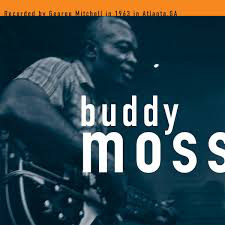
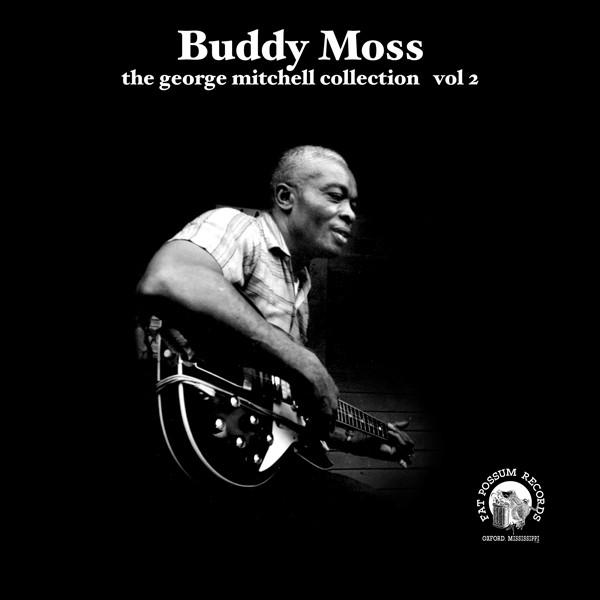
THE GEORGE MITCHELL COLLECTION
Fat Possum
Big Legal Mess
Spring 1963
Buddy Moss exerce différents métiers dans les états de Virginie et de Caroline du Nord tout en continuant de jouer de la guitare pour ses proches. Quand l'ethnomusicologue George Mitchell redécouvre Buddy, celui-ci n'a rien enregistré depuis plus de 20 ans. Malgré cela, il montre ici qu'il n'a rien perdu de sa technique à la guitare. Des titres comme "Amy", "Blue shadow falling", "You need a woman" le montrent aisément. Malgré la brièveté du programme (environ 20 minutes), il s'agit d'un document intéressant qui ne fut publié malheureusement qu'en 2006.
Buddy Moss works in various jobs in the Virginia and North Carolina states while continuing to play guitar for his friends and relatives. When the ethnomusicologist George Mitchell rediscovers Buddy, he hasn't recorded anything for more than 20 years. Despite this, he shows here that he has lost nothing of his technique on guitar. Titles like "Amy", "Blue shadow falling", "You need a woman" show it easily. Despite the brevity of the program (about 20 minutes), it is an interesting document which was unfortunately not issued until 2006.
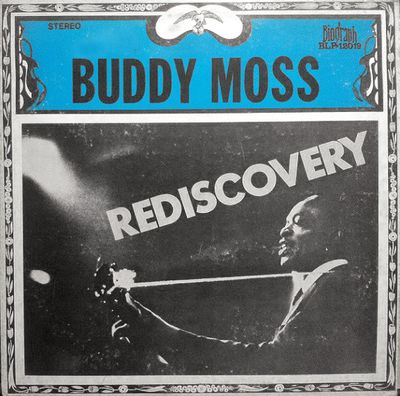
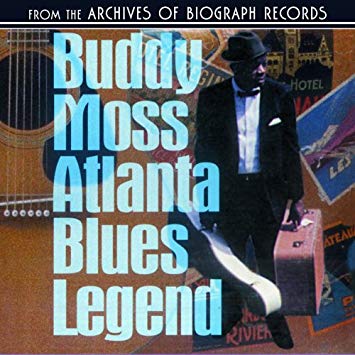
REDISCOVERY
Biograph
ATLANTA BLUES LEGEND
Biograph
Collectables
May - June 1966
En 1964, Buddy Moss assiste à un concert de son ami Josh White à l'Emory University d'Atlanta. Celui-ci l'incite à reprendre sa carrière. Son seul retour sera cet album. Dans le LP "Rediscovery", on trouve des faces live capturées au Gas Light Auditorium de Washington où Buddy est parfois accompagné de John Jackson. Le label Biograph, dans le CD "Atlanta blues legend" a ajouté à ces faces, des titres qui semblaient avoir été gravés pour Columbia à Nashville et qui restèrent inédits. Dans l'ensemble, le programme est un peu inégal mais Buddy est en bonne forme à la guitare et à l'harmonica. Méfiant vis à vis du Blues Revival, il refuse enregistrements et tournées qu'on lui propose. Il participe toutefois au festival folk de Newport en 1969.
In 1964, Buddy Moss attended a concert of his friend Josh White at Emory University in Atlanta. Josh encourages him to resume his career. His come back will be only this album. In the LP "Rediscovery", we find live tapes captured at the Gas Light Auditorium in Washington where Buddy is sometimes accompanied by John Jackson. The Biograph label, in the "Atlanta blues legend" CD added to these sides, some titles which seemed to have been recorded for Columbia in Nashville and which remained unissued. On the whole, the program is a little uneven but Buddy is in good shape on guitar and harmonica. Distrustful about the Blues Revival, he refused recordings and tours offered to him. However, he participates in the festival folk from Newport in 1969.